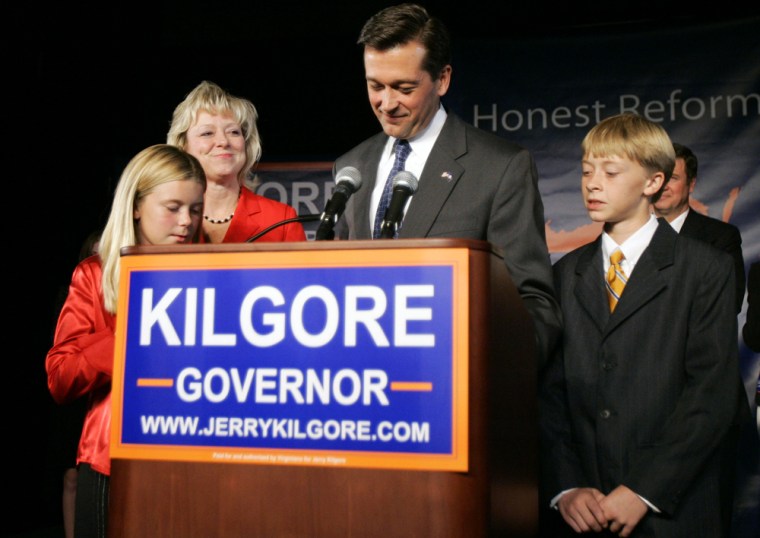Iraq, Katrina, CIA leak, Harriet Miers. Things couldn’t possibly get any worse for President Bush.
Wait, they just did.
Bush put his wispy political prestige on the line in the Virginia governor’s race and lost Tuesday when the candidate he embraced in a last-minute campaign stop was soundly defeated. While there are many reasons for Jerry Kilgore’s defeat, chief among them his poor campaign, giddy Democrats said the Virginia race as well as a Democratic victory in New Jersey prove that Bush is a political toxin for Republicans.
“The arrogance of saying, ‘I’m the Great George Bush. I’m coming to Virginia in the 12th hour and pulling Kilgore’s bacon out of the fire.’ I think he rallied Democrats with that move,” said Steve Jarding, a Democratic political consultant who helped elect Virginia’s current governor, Mark Warner.
“Democratic voters said, ’I’ll send you a message, George Bush, if that’s what you want.”’
It’s not clear that’s the message voters intended to send in Virginia or New Jersey, but Republicans couldn’t deny that Tuesday’s results heightened their anxieties about the 2006 midterm elections, when much more will be at stake, and raised questions about Bush’s political standing. Some blamed Bush for a low GOP turnout.
‘They just stayed home’
“Republicans are not so angry at the president that they want to vote for the other guy. They just stayed home,” said GOP consultant Rich Galen. Others noted that Bush battled conservative allies over Miers’ failed Supreme Court nomination and has drawn criticism from within the GOP ranks for government spending.
“The one bright spot for my party,” joked Republican Gov. Mike Huckabee of Arkansas, “is that the tab for the victory party at the Republican headquarters will be much smaller than if we had won.”
Huckabee, head of the National Governors Association, said off-year elections in New Jersey and Virginia don’t necessarily portend the next year’s results.
Virginia has not even been a reliable reflection of the national political environment. In 2001, Warner won election in 2001 when Bush had an 87 percent approval rating shortly after the Sept. 11, 2001, attacks. Four years earlier, Republican Jim Gilmore won the governorship in Virginia when President Clinton’s approval ratings were at nearly 60 percent.
At least Virginia is a Republican state that Bush won by 9 percentage points a year ago, making it fair barometer of the president’s political decline. New Jersey is solidly Democrat, won by Bush rival John Kerry.
In giving Democratic Sen. Jon Corzine an easy victory over Republican Doug Forrester, most New Jersey voters said Bush was not a factor in their choices, according to an AP-Ipsos survey of 1,280 New Jersey voters Tuesday.
Still, Corzine thanked voters “for rejecting the Bush-Rove tactics we see in politics,” referring to Karl Rove, the president’s top political strategist.
Of the 20 percent of New Jersey who said they voted in part to show opposition to the president, the most disaffected were young voters, women, blacks and low-income voters. The president’s job approval among New Jersey voters was 35 percent, slightly lower than an AP-Ipsos national poll last week.
In Virginia, Lt. Gov. Tim Kaine led Kilgore by about 5 percentage points, with most of the precincts reporting. He trounced Kilgore in Democratic northern Virginia and even bested him the far-flung suburbs of Loudoun and Prince William counties, winning in places where Warner had lost four years ago.
Local factors
Democrats would like to think those results show that Bush energized their voters in northern Virginia and depressed GOP turnout in exurbia. Just a year ago, Bush dominated in the outer suburbs, winning 97 of the nation’s 100 fastest growing counties.
But the results may have nothing to do with Bush. Kaine campaigned hard in exurban areas, promising to curb urban sprawl.
There were other local issues, including the death penalty. A Kilgore ad alleged that Kaine’s opposition to the death penalty meant he would not have executed Adolf Hilter. Kaine, a Roman Catholic, pledged to enforce the death penalty but said he would not apologize for his religious beliefs.
Republicans said the issue backfired on Kilgore. They also said he failed to connect with voters, particularly on TV, and said Kilgore’s liberal vs. conservative campaign theme was badly out of date.
So was it local issues or national ones that sunk Kilogre? A bit of both, perhaps.
“We can always go too far, and frequently do,” said University of Virginia political scientist Larry Sabato. “Is it a harbinger? Who knows. But it’s unadulterated bad news for Bush and the Republican Party and great news for Democrats as they attempt to make a comeback in 2006.”
Polls had Kilgore tied with Kaine headed into the final day when Bush flew from Panama to Virginia and laid his bets. It was a risky decision, ensuring that the president would be blamed for a Kilgore defeat. White House officials said Bush might as well go because in the current environment he would be blamed anyhow.
They were right.
